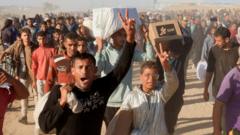In a striking display of somber reverence, North Korean leader Kim Jong-un commemorated troops lost in the ongoing Russia-Ukraine conflict, showcasing the complicated dynamics between military sacrifice and political maneuvering.
Kim Jong-un Honors Troops for Russian War Efforts Amid Tactical Partnerships

Kim Jong-un Honors Troops for Russian War Efforts Amid Tactical Partnerships
Kim Jong-un leverages the sacrifices of fallen North Korean soldiers to cement military ties with Russia, while navigating public sentiment through state media tributes.
Kim, accompanied by his daughter Kim Ju-ae and a Russian delegation, attended a tribute event in Pyongyang, signaling a public acknowledgment of North Korean military support for Russia. This comes on the first anniversary of a mutual defense treaty signed with President Vladimir Putin, underlining the deepening cooperation between the two nations amid global tensions.
North Korea, believed to have dispatched approximately 14,000 to 15,000 troops to aid Russian military efforts, formally recognized troop deployments and casualties earlier this year. Recent state television broadcasts finally illustrated North Korean soldiers participating in the conflict, with images of returning caskets and tributes that evoke national pride while manipulating emotion for state propaganda.
The duality of honoring fallen soldiers while using their sacrifice as a diplomatic bargaining chip raises complicated questions about war, loyalty, and the lengths to which regimes will go to maintain power and influence through foreign arenas.
North Korea, believed to have dispatched approximately 14,000 to 15,000 troops to aid Russian military efforts, formally recognized troop deployments and casualties earlier this year. Recent state television broadcasts finally illustrated North Korean soldiers participating in the conflict, with images of returning caskets and tributes that evoke national pride while manipulating emotion for state propaganda.
The duality of honoring fallen soldiers while using their sacrifice as a diplomatic bargaining chip raises complicated questions about war, loyalty, and the lengths to which regimes will go to maintain power and influence through foreign arenas.




















